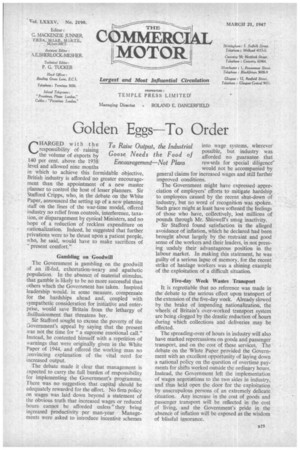Golden Eggs—To Order
Page 25

If you've noticed an error in this article please click here to report it so we can fix it.
CHARGED with the responsibility of raising the volume of exports by 140 per cent. above the 1938 level and allowed nine months in which to achieve this formidable objective, British industry is afforded no greater encouragement than the appointment of a new master planner to control the host of lesser planners. Sir Stafford Cripps, who, in the debate on the White Paper, announced the setting up of a new planning staff on the lines of the war-time model, offered industry no relief from controls, interference, taxation, or disparagement by cynical Ministers, and no hope of a reduction of reckless expenditure on nationalization. Indeed, he suggested that further privations were to be thrust upon a patient people, who, he said, would have to make sacrifices of present comfort." .
Gambling on Goodwill The Government is gambling on the goodwill of an ill-fed, exhortation-weary and apathetic population. In the absence of material stimulus, that gamble is likely to be no more successful than others which the Government has taken. Inspired leadership would, in some measure, compensate for the hardships ahead and, coupled with sympathetic consideration for initiative and enterprise, would save Britain from the lethargy of disillusionment that threatens her.
Sir Stafford sought to excuse the poverty of the Government's appeal by saying that the present was not the time for "a supreme emotional call." Instead, he contented himself with a repetition of warnings that were originally given in the White Paper of 1944, and offered the working man no :onvincing explanation of the vital need for increased output.
The debate made it clear that management is z.xpected to carry the full burden of responsibility for implementing the Government's programme. There was no suggestion that capital should be adequately rewarded for the effort. No firm policy on wages was laid down beyond a statement of the obvious truth that increased wages or reduced hours cannot be afforded unless they bring increased productivity per man-year Managements were asked to introduce incentive schemes into wage systems, wherever possible, but industry was afforded no guarantee that rewards for special diligence' would not be accompanied by general claims for increased wages and still further improved conditions.
The Government might have expressed appreciation of employers' efforts to mitigate hardship to employees caused by the recent shut-down of industry, but no word of recognition was spoken. Such grace might at least have softened the feelings of those who have, collectively, lost millions of pounds through Mr. Shinwell's smug inactivity. Sir Stafford found satisfaction in the alleged avoidance of inflation, which he declared had been brought about largely by the restraint and good sense of the workers and their leaders, in not pressing unduly their advantageous position in the, labour market. In making this statement, he was guilty of a serious lapse of memory, for the recent strike of haulage workers was a shining example of the exploitation of a difficult situation.
Five-day Week Wastes Transport It is regrettable that no reference was made in the debate to the serious effect upon transport of the extension of the five-day week. Already slowed by the brake of impending nationalization, the wheels of Britain's over-worked transport system are being clogged by the drastic reduction of hours during which collections and deliveries may be effected.
The spreading-over of hours in industry will also have marked repercussions on goods and passenger transport, and on the cost of these services. The debate on the White Paper provided the Government with an excellent opportunity of laying down a national policy on the question of overtime payments for shifts worked outside the ordinary hours. Instead, the Government left the implementation of wages negotiations to the two sides in industry, • and thus held open the door for the exploitation by unscrupulous persons of an extremely delicate situation. Any increase in the cost of goods and passenger transport will be reflected in the cost of living, and the Government's pride in the absence of inflation will be exposed as the wisdom of blissful ignorance.












































































